Brussels' €2bn fraud bill threat to Brexit trade deal
UK seen as a 'soft touch' for criminal gangs who avoid billions in excise and VAT costs, say reports

A free daily email with the biggest news stories of the day – and the best features from TheWeek.com
You are now subscribed
Your newsletter sign-up was successful
Britain may have to settle a bill of up to €2bn (£1.7bn) to secure a customs deal with the EU after Brexit, says The Times.
Brussels believes the UK has become a "soft touch" for customs fraud by criminal gangs operating out of the likes of China, with goods coming through Felixstowe and Dover and then being shipped to the continent.
"The gangs chose Britain because they are allowed to declare imported goods at impossibly low values," says the Times, meaning they pay very low rates of tax.
The Week
Escape your echo chamber. Get the facts behind the news, plus analysis from multiple perspectives.

Sign up for The Week's Free Newsletters
From our morning news briefing to a weekly Good News Newsletter, get the best of The Week delivered directly to your inbox.
From our morning news briefing to a weekly Good News Newsletter, get the best of The Week delivered directly to your inbox.
Figures from EU customs regulator Olaf show the average price declared for women's cotton trousers is 77p per kilo in the UK, compared to a wider EU average of £22 per kilo, says the Daily Mail.
The Times adds: "The seriousness of the fraud is exacerbated because 86 per cent of the suspicious goods are immediately re-exported to the continent, usually by 'shadow companies' that disappear without paying VAT.
"Olaf has calculated the excise losses at €2bn and the VAT loss at €3.2bn from 2013-16."
Meg Hillier, chairwoman of the Commons public accounts committee, said: "The major loss may be to the EU budget but British businesses are being affected by this because they are being undercut by people who are not paying duties and taxes.
A free daily email with the biggest news stories of the day – and the best features from TheWeek.com
"It creates an unlevel playing field and that hits British jobs."
A European Commission source said "Britain knows" about the fraud and that this "will come up in trade discussions and it will have an impact on the future customs relationship" after Brexit.
According to HMRC, Olaf's figures were not recognised by its experts. It added it is handling hundreds of cases related to potential fraud.